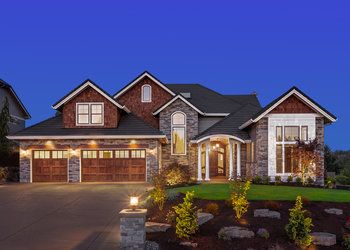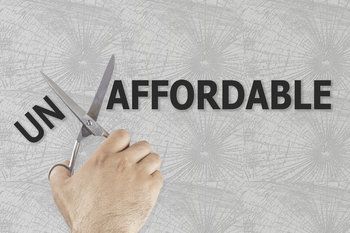 There are a lot of things you can count on when you buy a home. These include a comfortable shelter. A chance to build equity. And a place to build lasting memories with your family. But there's one big uncertainty you'll face as a new owner: Will you get along with your neighbors?
There are a lot of things you can count on when you buy a home. These include a comfortable shelter. A chance to build equity. And a place to build lasting memories with your family. But there's one big uncertainty you'll face as a new owner: Will you get along with your neighbors?
Would you pay more to choose your neighbors?
Indeed, the people who live next door or on the block have a bigger impact on your experience as a homeowner than you might think. Annoying neighbors, difficult block denizens, and sketchy residents nearby can suck the fun out of living in a particular location. That's a big reason why a new study shows many would pay a premium if they were allowed to choose who lives close by.
Of course, you can't actually pick your neighbors. You don't want to hate your neighbors, either. To avoid this, rule out homes for sale that may be near problematic people. And help nurture a healthy relationship with folks on the block after you move in.
What the research found
A recent Rent.com poll of 1,000 homeowners and renters had some interesting findings:
- Single-family home owners would pay $157 extra a month, on average, to pick who lives next door
- Apartment, condo, town home, and duplex dwellers would pay $179 monthly, on average, for this privilege
- Millennials would pay the most ($203), followed by Gen Xers ($145) and baby boomers ($45), on average
- The longer you live in a residence, the longer you are inclined to be satisfied with your neighbors. Among those who have lived in a home for an average of 8.3 years, 72.5% of single-family home owners and 57.1% of multi-family home dwellers are happy with their neighbors vs. 11.1% and 16.7% who aren't, respectively
- People became friends with only 29.1% of the neighbors they met; nearly four in 10 said they were not friends with any of their neighbors
Related: How to Research a Neighborhood Before You Buy
Breaking down the data
Joey Campbell, director of content for Rent.com, says another survey finding surprised him even more.
"Renters were willing to pay $225 extra in monthly rent if they had the option to choose their neighbors," he says.
Campbell notes that this report has some important takeaways. First, neighbors can impact your life more than you realize. Second, making connections with neighbors and trying to develop friendships can make a big difference.
"Most people understand that having a good relationship with your neighbors is valuable from a practical standpoint. Friendly neighbors can help each other with basic day-to-day tasks," he adds. "These include keeping a spare key, lending each other cooking ingredients, and keeping an eye on pets and children in a pinch."
Ralph DiBugnara, president of Home Qualified, echoes those thoughts.
"Especially in a renting situation, you could be living in close quarters with your neighbors. This could make life very uncomfortable if you are not on friendly terms," says DiBugnara.
And for homeowners in particular, "A bad neighbor could hurt the value of your home and ability to resell. This could depreciate your asset and investment," DiBugnara continues.
Related: Top neighbor annoyances
Don't hate your neighbors: Get to know them
Want to avoid getting off on the wrong foot with neighbors? Eager to sidestep making enemies with the folks next door? Follow these tips:
Try to meet your closest neighbors before you move in. Knock on their doors. Introduce yourself. And ask what they enjoy about living there. You may get a sense right away as to how friendly or not these people are.
Invite neighbors over. Try throwing a housewarming party. Leave paper invitations in your neighbors' mailboxes. Make an effort to get to better know anyone who attends. Be welcoming, courteous, and hospitable by offering tasty foods and drinks.
Take a moment to smile and say hello whenever you see a neighbor. "This is a minimal time investment that goes a long way in showing your friendliness," says Campbell.
Build connections. "Find links between you and your neighbors. Kids, pets, or favorite pastimes offer opportunities to start a conversation," Campbell recommends. "If you see you have something in common, mention it the next time you see your neighbor and open the door to further conversation."
Get outside and explore your neighborhood. "It's hard to develop a relationship with someone if you don't physically see them. Active neighbors tend to meet more people and develop more friendships," advises Campbell.
Offer a helping hand. "If you see a neighbor with a stalled car, offer a jump start. If they look like they're packing for a trip, volunteer to keep an eye on their home," adds Campbell.
Aim for compromise. With bad neighbors, "you are probably going to have to give some to get some of what you want," says DiBugnara. "A peaceful relationship may take some sacrifice on your part."
Related: Top neighborhood annoyances
Are YOU the neighbor everyone hates?
If you indulge in the hated behaviors listed below (compiled by Furniture Choice), chances are you're not the most popular person on your street.
- Slamming doors and loud arguments (31%)
- Blocking driveways (29%)
- Parking in others' spaces (24%)
- Trash outside the house (23%)
- Loud TV / music (22%)
- Rundown exterior (21%)
- Noisy pets outside (17%)
- Noisy kids (17%)
- Too many deliveries neighbors have to sign for (16%)
- Not cleaning up after pets (15%)
Part of being a good neighbor is understanding how your choices affect others on your block. And it's easier to get cooperation from others if you're considerate yourself.



